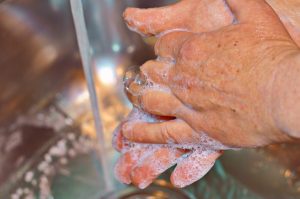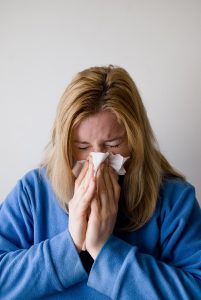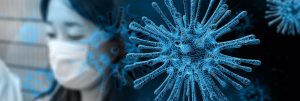
Schedule A Consultation
healing your body for the long run
Contact Us

You’ve probably been hearing a lot about the coronavirus lately, but can you separate the fact from the fiction? At times like these, misinformation can run rampant, so we feel it’s important to lay out the facts about coronavirus, what to do to protect yourself, and what to do to protect the people around you.
What is Coronavirus?
There are several types of coronaviruses that are part of the coronavirus family, and they range in severity from the common cold to Middle East Respiratory Syndrome (MERS-CoV) and Severe Acute Respiratory Syndrome (SARS-CoV). Novel coronavirus, or COVID-19, is a new coronavirus that causes symptoms of fever, cough, and shortness of breath. It is being called COVID-19 because the official name for the disease is coronavirus disease 2019, with “CO” standing for corona, “VI” for virus, and “D” for disease.
Who Is At Risk?
Certain groups are at higher risk of becoming seriously ill or experiencing complications from this virus. These groups include older adults, those with serious chronic medical conditions, including heart disease, diabetes, and lung disease, and anyone with a compromised immune system. However, this does not mean that you should ignore recommended preventive actions if you do not fall into one of these groups. Even if you don’t become seriously ill from the virus, you can potentially spread it to someone who falls into one of these groups.
Fortunately, there is currently no evidence that children, unless they have a compromised immune system, are more susceptible or sensitive to coronavirus, and most confirmed cases in China occurred in adults. Of course, children should still be taught to take the same preventive actions as adults.
What Can I Do to Protect Myself?
 The CDC is currently recommending the following preventive actions in order to decrease the spread of coronavirus. The most important thing is to do whatever we can to avoid exposure and exposing others.
The CDC is currently recommending the following preventive actions in order to decrease the spread of coronavirus. The most important thing is to do whatever we can to avoid exposure and exposing others.
Coronavirus is believed to mainly be spread from person to person, either by coming into close contact (within 6 feet) with someone who is infected or via respiratory droplets that are produced when an infected person coughs or sneezes. When someone coughs or sneezes, these droplets that are produced can potentially land in the mouths or noses of people surrounding them, which can lead to these droplets being inhaled into the lungs.
Here’s what you should be doing (and avoiding) in order to protect yourself:
Wash your hands often with soap and water.You should also wash your hands for at least 20 seconds, especially after being in public spaces, coughing, or sneezing. If you do not have access to soap and water,
use a hand sanitizer containing at least 60% alcohol. When applying, cover the entire surface of your hands and rub them together until dry. If you wipe your hands before the sanitizer has dried, it will not work. If you have not washed your hands, avoid touching your mouth, nose, and eyes. Avoid close contact (being within 6 feet) with people who are sick. If coronavirus is known to be spreading within your community, do what you can to put space between yourself and others, especially if you are part of a high-risk group.
What to do to protect others:
Stay home if you’re sick unless getting medical care. Cover your mouth and nose with either a tissue or the inside of your elbow when you cough or sneeze. Throw used tissues in the trash. Wear a face mask if you are sick. If you’re sick, you should be wearing a face mask when around other people and when entering a healthcare provider’s office. If you are unable to wear a face mask for whatever reason, be sure to cover your mouth and nose when coughing or sneezing. If you are not sick you do not need to wear a face mask unless you are treating someone who is sick and cannot wear a face mask. Increased demand for face masks can lead to a short supply, leaving health providers without them. Clean and disinfect any surfaces that are regularly touched on a daily basis. High-touch surfaces include tables, doorknobs, keyboards, desks, phones, toilets, light switches, faucets, countertops, handles, and sinks. Clean any dirty surfaces with detergent or soap and water before disinfecting.
Cover your mouth and nose with either a tissue or the inside of your elbow when you cough or sneeze. Throw used tissues in the trash. Wear a face mask if you are sick. If you’re sick, you should be wearing a face mask when around other people and when entering a healthcare provider’s office. If you are unable to wear a face mask for whatever reason, be sure to cover your mouth and nose when coughing or sneezing. If you are not sick you do not need to wear a face mask unless you are treating someone who is sick and cannot wear a face mask. Increased demand for face masks can lead to a short supply, leaving health providers without them. Clean and disinfect any surfaces that are regularly touched on a daily basis. High-touch surfaces include tables, doorknobs, keyboards, desks, phones, toilets, light switches, faucets, countertops, handles, and sinks. Clean any dirty surfaces with detergent or soap and water before disinfecting.
What Should I Do if I Get Sick?
 If you believe you have been exposed to coronavirus, or know that you have been in close proximity to someone who is infected and have developed symptoms including dry cough, difficulty breathing, and fever, call your doctor immediately. You should also have your healthcare provider contact your state or local health department if you are being monitored for COVID-19.
If you believe you have been exposed to coronavirus, or know that you have been in close proximity to someone who is infected and have developed symptoms including dry cough, difficulty breathing, and fever, call your doctor immediately. You should also have your healthcare provider contact your state or local health department if you are being monitored for COVID-19.
After doing that, these are the steps you should be taking to avoid spreading your illness to others:
Stay home, avoid public areas and public transportation. Separate yourself from other people and animals within your home. As much as possible, you should stay in a specific room and use a separate bathroom from others in your household. Before visiting your doctor, call ahead and let them know that you have or may have COVID-19 in order to allow them to take necessary steps to prevent others from being exposed. Avoid sharing personal household items. You should not share dishes, drinking glasses, eating utensils, towels, or bedding, and these items should be washed thoroughly with soap and water after use.
At the end of the day, the best ways to take care of yourself are by staying informed about emerging news about coronavirus from reputable and trusted sources like the CDC, WHO, and FDA, and monitoring your symptoms and quickly getting medical care if you show signs of coronavirus. Remember, in order to protect yourself and those around you, it’s important to stay calm, stay informed, and be mindful of taking the recommended actions to prevent the spread of the virus.